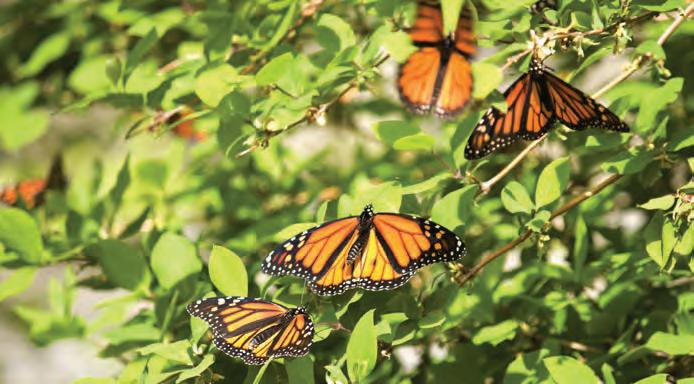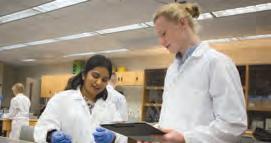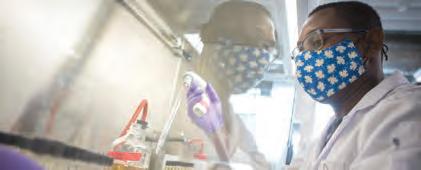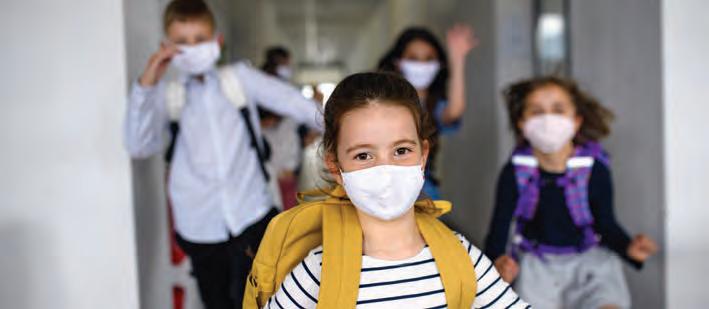
4 minute read
Spotlight on Research
As home to many of the world’s leading researchers, Trent University has countless stories to tell when it comes to research success. Through our outstanding researchers, world-class facilities, and prestigious schools of study, Trent is a place where ideas and creativity connect and intersect with industry, non-profits, communities and real-world solutions. Read more about some of the top faculty, student, and alumni researchers who are making headlines.
FACULTY RESEARCH SPOTLIGHT The Beauty of Butterflies – Teaching Old Genes New Tricks FACULTY
The spectacular and intricate colour patterns on the wings of butterflies are one of the most noted examples of beauty in the natural world. With over 22,000 different butterflies, yet no two demonstrating the same patterns, Dr. Craig Brunetti, leading researcher and dean of the School of Graduate Studies, investigates the role certain genes play in these unique and striking patterns. While Professor Brunetti’s research primarily focuses on viruses and immunology, his interest in butterfly wing patterning is a long-standing project. Thanks to advances in technology, the use of CRISPR/Cas9 deletion techniques allowed for further insight into key gene function and interaction, particularly that of the Spalt gene in wing margin colour patterning.

STUDENT STUDENT RESEARCH SPOTLIGHT
Novel Research Examines Neurodegenerative Disease
A lifelong fascination with the intricate workings of the human brain has led Joesphine Esposto, M.Sc. candidate in the Environmental and Life Sciences program, to explore the puzzling questions surrounding its functions.
With her current research at Trent, Ms. Esposto is beginning to study and critically analyze the major pathological protein causing Amyotrophic Lateral Sclerosis (ALS)—also known as Lou Gehrig’s disease—and other neurodegenerative diseases such as TDP-43.
“Not much is known about the research on this protein, and only a few institutions across the globe are looking into it,” says Ms. Esposto. “Because of this, I will be experimenting with a protein that is unique to the Martic Lab at Trent.” Ms. Esposto is hopeful that the published work will lead to viable treatment options to help people suffering from ALS. “At the very least, it will help shine more light on how the disease progresses.”

#TRENTURESEARCH HIGHLIGHTS

ALUMNI RESEARCH SPOTLIGHT From Self-Dissolving Dressings to Human Tissue Growth ALUMNI
A receding gum line can be a real pain. As gums recede the roots of the teeth may be exposed. Periodontists treat the condition by grafting tissue from the roof of a patient’s mouth, which can be painful.
Under the guidance of Chemistry professor Dr. Andrew Vreugdenhill, Trent alumnus Brian Webb ’20, B.Sc., Biomedical Science, developed a selfdissolving wound dressing with anti-bacterial properties derived from plant extracts. Mr. Webb, now pursuing his Master of Applied Sciences, is building on his innovative undergraduate thesis, as he begins to work on a technique that uses human stem cells to grow dense three-dimensional tissues in the laboratory. “This way you can get blood and nutrients going into the scaffold as soon as possible,” explains Mr. Webb. “You will be implanting something that already has all of the vasculature.”

DR. CATHY BRUCE APPOINTED ACTING VICEPRESIDENT RESEARCH AND INNOVATION

In August, Professor Bruce was appointed to this new role at Trent, bringing 17 years of proven leadership and dedication to collaborative research. To inform the societal response to COVID-19 and future infectious diseases, Trent has mobilized funding to invest in nine research projects that will contribute to our holistic understanding of the pandemic and how to mitigate its impact. Here’s a sample of research projects currently underway.

NSERC Alliance Grant to Focus on Rapid SARS-C0V-2 Detection Dr. Sanela Martic, an assistant professor of Forensic Science at Trent and cross-appointed to the Environmental and Life Sciences graduate program, is working to develop a benchtop testing method that can rapidly detect the SARS-CoV-2 virus. The Natural Sciences and Engineering Research Council (NSERC) has awarded Professor Martic an Alliance Grant to collaborate with an Ontario-based biotechnology company to study optical sensors as a rapid and cost-effective alternative for SARS-CoV-2 detection that may be used by individuals without specialized health care training.
Exploration of Vaccine Hesitancy in a COVID-19 World Dr. Kelly McGuire, associate professor of English and Gender & Women’s Studies and chair of Gender and Women’s Studies, is working to inform the societal response to COVID-19 and potential future infectious disease outbreaks. Professor McGuire will focus her research on exploring the specific dynamics of vaccine hesitancy as well as concerns relating to social justice and gender—areas that public-health campaigns have been criticized for not sufficiently addressing in the past.
The Impact of Physical Distancing on Older Volunteers Dr. Elizabeth McCrillis, director of the Trent Centre for Aging and Society, and a team of researchers at Trent are studying how the elderly and older volunteers in rural communities are coping with the impacts of physical distancing during the COVID-19 pandemic. While COVID-19 is particularly dangerous to the physical health of older members of the population, the social-distancing measures meant to protect them can be just as damaging. The study seeks to gain an understanding of the experiences of rural older adult volunteers as the pandemic has significantly limited the ability of volunteers to support older community members.
Follow @TrentUniversity #TrentUResearch on Twitter to read more research highlights and stories, and share your own #TrentU research stories.








